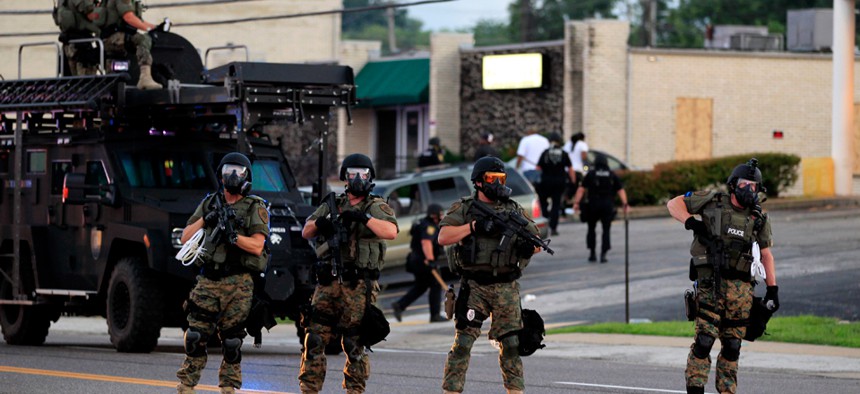At This Point, Ferguson Is a City Under Siege

Police in riot gear work near crowds gathering in Ferguson Monday evening. Jeff Roberson/AP
What's being described as a "riot" is looking a lot more like an occupation.
The standoff between police and protesters in Ferguson, Missouri, over the police shooting of Michael Brown turned violent last night. A St. Louis County Police officer shot and critically wounded a man in the area where protesters have assembled since Saturday. The St. Louis Post-Dispatch reports that the man is said to have pulled a handgun on the officer, and police recovered the weapon at the scene. Another woman was shot in a conflict that may or may not be related to the protests; she is expected to survive.
Media outlets have used the word "riot" dozens of times, even hundreds of times, to describe the crisis in Ferguson. Yet despite last night's violence, three days after the death of the unarmed 18-year-old resident, Ferguson does not yet resemble the notable riots from the 1960s to the present day. Rather, it is starting to look like an occupation.
The chaotic night-time scenes centered on the QuikTrip gas station—one of a handful of shops that was looted during Sunday night demonstrations, and now a burned-out symbol for the community's misery—were matched by quieter images. Missouri Governor Jay Nixon and Ferguson Police Department chief Thomas Jackson spoke to a standing room–only crowd at Christ the King United Church of Christ. Another packed house greeted the Rev. Al Sharpton at the Greater St. Mark Missionary Baptist Church.
Protesters continue to hone their public message and rallying cries. Dorian Johnson, a friend of Brown's and an eyewitness to his death, gave interviews to MSNBC's Chris Hayes and Trymaine Lee—though police in St. Louis have reportedly not yet interviewed him. Witnesses in Ferguson took to social media to discuss the police use of tear gas to keep residents from moving in certain areas.
"The hands-up—a sign of surrender and submission black men and boys here say they learn early on when dealing with police—has been transformed into a different kind of weapon," writes Matt Pearce, a Los Angeles Times reporter working from Missouri.
In contrast to the community's outcries, the police have remained silent. (UPDATE 12:32 p.m.: The Ferguson Police Department released a statement that asks protesters to disperse before evening hours.) Authorities have not released the name of the officer who shot Brown, fearing for the safety of the officer and his family. They have yet to release findings from Brown's autopsy, saying officially only that Brown was shot "more than just a couple of times.” TheFederal Aviation Administration instituted a no-fly zone over Ferguson through Aug. 18, meaning that police helicopters can operate in the area, but media helicopters cannot.
David A. Klinger, a professor in the Department of Criminology and Criminal Justice at the University of Missouri-St. Louis, says that the public does not have enough information about the standoff to determine whether police are taking the right course of action. But he adds that police appear to be taking pre-emptive measures to prevent a more destructive conflict, like the 1992 riots in Los Angeles or the 2001 riots in Cincinnati.
"On its face, there is nothing that I see that is problematic," Klinger says. "But it is entirely possible that some uses of force are inappropriate."
An article on crowd management in the FBI Law Enforcement Bulletin suggests that the police blockade in Ferguson falls short of the model for dealing with civil unrest, however. The 2012 report, drawing on lessons learned from civil conflicts in Britain and the U.S.—from the riots to the relatively recent Occupy protests—recommends against turning toward a military-style response so quickly:
Officers must avoid donning their hard gear as a first step. They should remember lessons learned from the 1960s civil rights movement and Vietnam War protests. Police should not rely solely on their equipment and tools. Experience shows that when used as a primary tactical option in public order policing, dialogue is invaluable. Law enforcement officers must defuse confrontations to ensure strong ties with the community. If they fail, rather than stronger community goodwill, the effect will be less civility and the erosion of constitutional rights.
Yet police in St. Louis County deployed military-style equipment just after protests took root—before the isolated incidents of looting. Optically, the situation could not be worse, as the Ferguson Police Department and the much larger St. Louis County Police Department are staffed overwhelmingly with white officers, while the majority of Ferguson residents are black. As the crisis develops, the meaning of the demonstration now includes a protest over the police response to the initial demonstration.
It's unclear what the police objective in Ferguson is going forward. But if sporadic violence in Ferguson continues, Klinger says, the situation on the ground will likely continue—with heavily armored white officers on one side of the skirmish line and black residents with their hands up on the other.





